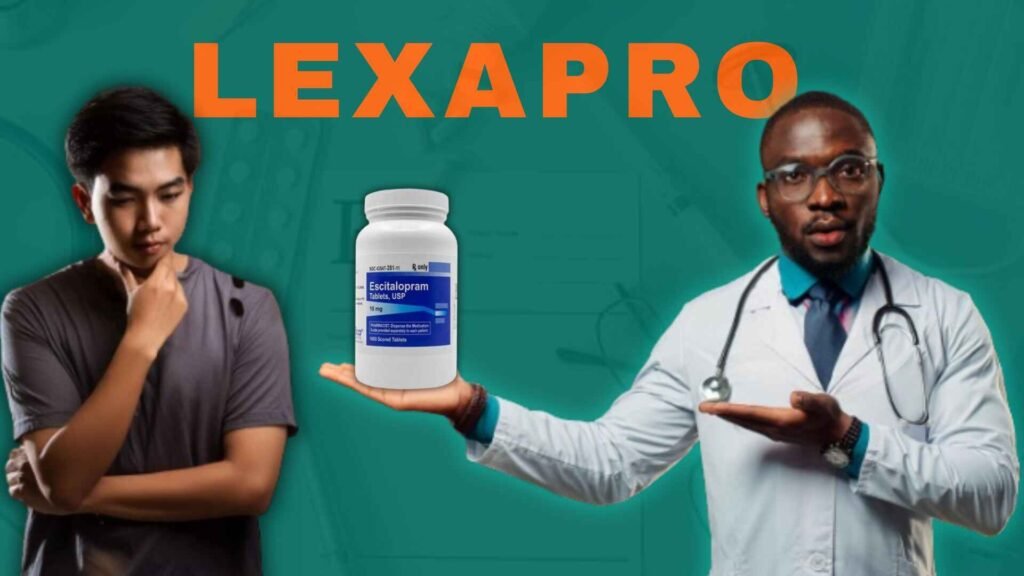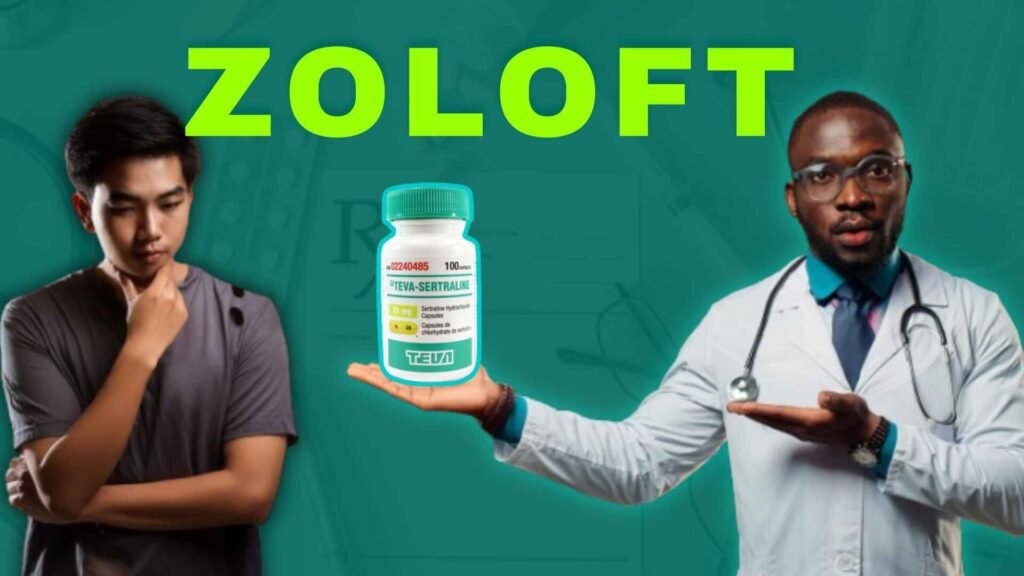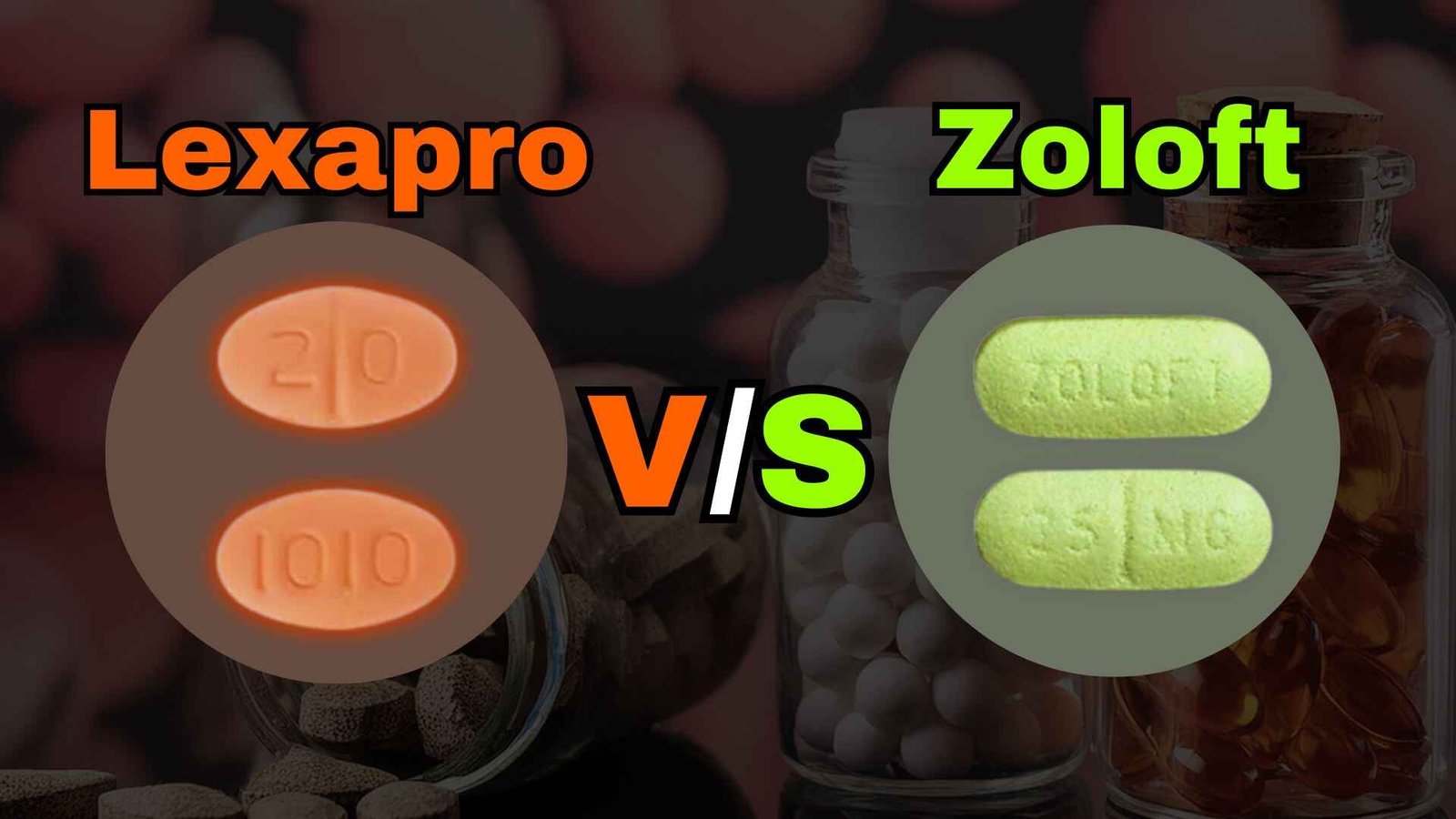Lexapro vs Zoloft: Which antidepressant is right for you? Learn their differences and find your best fit for mental health. These drugs are commonly used in the treatment of various psychiatric disorders such as depression and anxiety.
Choosing the right antidepressant for the treatment process is a critical decision. This guide will explain the side effects, uses, effectiveness, and factors to consider when using these two frequently prescribed medications.
What Are Antidepressants?
Antidepressants are the class of drugs used for treating depression and, in many cases, anxiety disorders, through the enhancement of the levels of specific chemicals involved in neural transmission. Lexapro vs Zoloft comparisons often focus on how these medications target neurotransmitters like serotonin, dopamine, and norepinephrine, which regulate mood, emotions, and stress responses.
In this way, by changing these chemicals, antidepressants can help patients get rid of such symptoms as persistent sadness and hopelessness, anxiety, and other problems that interfere with mood stability and general quality of life. Lexapro vs Zoloft are commonly prescribed by doctors and come in various types which work in different ways to help you feel like you again. Gabapentin is another medication that’s sometimes used along with antidepressants to help manage anxiety and nerve-related pain. It can provide extra support in treatment plans that are customized to fit your specific needs.

Types of Antidepressants
The antidepressants are of several types and are classified as Tricyclic Antidepressants (TCAs), Monoamine Oxidase Inhibitors (MAOIs), and most common today are the Selective Serotonin Reuptake Inhibitors (SSRIs). Lexapro vs Zoloft is a common issue, as these medicines are usually preferred within the SSRI group because of their minimum side effects. Additionally, medications like Propranolol, Hydroxyzine, and Wellbutrin (bupropion) may also be prescribed for anxiety or related symptoms.
SSRIs: An Introduction
Again, SSRIs which stands for Selective Serotonin Reuptake Inhibitors, help by increasing the concentration of serotonin in the brain. Lexapro vs Zoloft comparisons highlight how these medications inhibit serotonin’s reabsorption (reuptake) into neurons, allowing it to remain active for longer periods. This class comprises widely-used drugs like Lexapro and Zoloft which are prescribed for treating various mood disorders like depression and anxiety.
Lexapro (Escitalopram)
Lexapro, known generically as escitalopram, was developed by the pharmaceutical company Lundbeck. More often, Lexapro vs Zoloft compares their efficacy, since Lexapro received FDA approval in the United States in 2002 to treat major depressive disorder (MDD) and generalized anxiety disorder (GAD). Like other products in the group of SSRIs, Lexapro influences the amount of serotonin – a neurotransmitter, present in the brain, which in turn assists in controlling depression, anxiety disorders, and other states that negatively affect mental health. In most instances, Lexapro is typically prescribed once a day and can be used in short-term and long-term treatment plans.
Mechanism of Action
It is an SSRI antidepressant that regulates serotonin levels in the brain since the chemical controls a person’s mood, emotions, and sleep; hence, Lexapro is efficient in treating depression and anxiety disorders. Lexapro vs Zoloft comparison revolves around evaluating how each of the drugs promotes the function of serotonin in the treatment of mental disorders.
Indications
Lexapro is primarily used to treat:
- Major Depressive Disorder (MDD): Clinically, Lexapro treats major depression, which includes symptoms such as persistent low mood, lack of interest in previously enjoyed activities, listlessness, and changes in eating and sleeping patterns. It works by regulating serotonin levels in the brain, which has been shown to alleviate symptoms of depression and sometimes anger

- Generalized Anxiety Disorder (GAD): It is also prescribed for generalized anxiety disorder, which is diagnosed when a patient exhibits excessive, chronic worrying about various aspects of life. As an SSRI, it aids in diminishing signs of anxiety such as agitation, increased tension, muscle stiffness, and difficulty in focusing, and it also boosts serotonin levels in the brain.
Dosage and Administration
Lexapro comes in tablets and liquid solution; the dosage is usually once daily, and it can be taken with or without food. In adult patients, the typical dosage is 10 mg per day, which may be adjusted to 20 mg per day.
Efficacy
As for its sphere of usage, Lexapro has proven effective in treating both depression and anxiety-related conditions in clinical trials. It typically begins to show results within twelve weeks, with optimal results achieved by forty-six weeks.
Side Effects
Common side effects of Lexapro include:
- Nausea
- Insomnia
- Fatigue
- Dry mouth
- Increased sweating
Less common but more serious side effects may include:
- Sexual dysfunction
- Weight changes
- Serotonin syndrome (rare but serious condition caused by high levels of serotonin)
User Experiences
Most users have positive feedback on improved symptoms of depression and anxiety. Some said that side effects gradually go away after a while. While others may require a change in their dosage or the medication they take.
Zoloft (Sertraline)
Sertraline or Zoloft was created by Pfizer and later took the FDA nod in 1991. It is used to manage different mental disorders due to the effect of enhancing the serotonin levels in the brain thus boosting moods and reducing the level of anxiety. Officially approved to treat major depressive disorder, generalized anxiety disorder, panic disorder, social anxiety disorder, post-traumatic stress disorder, premenstrual dysphoric disorder, and obsessive-compulsive disorder, Zoloft remains one of the most popular drugs employed in the context of mental health disorders because of its high efficiency and moderate impact on the patient’s body.”
Mechanism of Action
Similar to Lexapro, Zoloft boosts the levels of serotonin in the brain by inhibiting its reuptake into neurons. This is beneficial for boosting mood and minimizing anxiety. Zoloft also affects other neurotransmitters such as dopamine and norepinephrine.
Indications
Zoloft is used to treat:
- Major Depressive Disorder (MDD): Relieves some of the symptoms of depression by regulating a person’s emotions and reducing feelings of hopelessness, fatigue, changes in appetite, and mode of sleep.
- Obsessive-Compulsive Disorder (OCD): Minimizes the frequency of obsessive and compulsive ideas and activities that interfere with the patient’s everyday life.
- Panic Disorder: Approaches acute panic attacks by controlling the heightened episodes of fear and the accompanying physical manifestations such as palpitations, sweating, and shortness of breath to decrease their occurrence and severity.
- Post-Traumatic Stress Disorder (PTSD): Helps in decreasing some symptoms that are associated with traumatic events like PTSD, which include flashbacks, nightmares, severe anxiety, paranoia, and hypervigilance, thus promoting emotional regulation.

- Social Anxiety Disorder(SAD): Reduces the severity of anxiety regarding overcoming social disturbances and increases the social adaptability of an individual, improving their functioning in society.
- Premenstrual Dysphoric Disorder (PMDD): Reduces features such as severe mood swings, irritability, depression, and somatic symptoms that are linked to the premenstrual phase, thereby improving the quality of a woman’s life and functionality during the premenstrual phase of the menstrual cycle
Dosage and Administration
There are Zoloft tablets and there is a liquid form of Zoloft; the typical dose is once a day. Treatment for depression and anxiety usually starts with a daily dose of 50 mg, which can then be adjusted up to 200 mg daily based on the individual’s ability to tolerate the medication.
Efficacy
Some prevalent anxiety and depressive disorders treated using Zoloft include but are not limited to, the following. Similar to Lexapro, improvements might start to be seen within a couple of weeks, with the full effect typically revealing itself in 6 to 8 weeks.
Side Effects
Common side effects of Zoloft include:
- Nausea
- Diarrhea
- Dizziness
- Dry mouth
- Fatigue
Less common but more serious side effects may include:
- Sexual dysfunction
- Weight changes
- Increased risk of bleeding
- Serotonin syndrome
User Experiences
Most patients who take Zoloft report that the medicine helps in controlling their symptoms. Some experience mild reactions, which are typically associated with withdrawing from their previous medication. They overcome these reactions as they continue using the new medication. Others may need to switch to different strengths or medications.
Comparative Analysis
- Effectiveness: Lexapro vs Zoloft: Both drugs have been proven effective in treating cases of depression and anxiety disorders. Comparative research indicates that Lexapro might be slightly more potent in treating patients with GAD, while Zoloft has numerous alternatives.
- Side Effects: Lexapro vs Zoloft: Regarding side effects, Lexapro has been noted to be as effective as Zoloft; however, individual cases may show differences. Clients with eating disorders on Lexapro have reported experiencing fewer gastrointestinal symptoms compared to those on Zoloft. However, side effects related to sexual ability and weight loss/gain are observed with both drugs.
- Speed of Action: Lexapro vs Zoloft: Both selective serotonin reuptake inhibitors, Lexapro and Zoloft, typically show results in twelve weeks, with maximum results in forty-eight weeks. The speed of action can vary depending on the individual and the illness being treated.
- Long-Term Use: Lexapro vs Zoloft: These drugs are not known to have severe side effects when taken long-term, although patients should consult with their healthcare provider. To prevent the emergence of side effects or a decrease in efficacy, the medication should be taken over a long period, and the patient’s condition should be monitored.
- Withdrawal Symptoms: Lexapro vs Zoloft: It is important to understand that patients who decide to stop taking Lexapro or Zoloft may experience withdrawal symptoms such as dizziness, irritability, nausea, and flu-like symptoms. These symptoms should be stopped gradually and not abruptly; therefore, it is advisable to seek medical advice when discontinuing the medications.
- Interactions with Other Medications: Lexapro vs Zoloft: Both Lexapro and Zoloft can interact with other medications such as other antidepressants, blood thinners, and specific pain relievers. It is always important to disclose the use of any medications and supplements to your doctor.
- Use in Specific Populations: Pregnancy: Both medications can be used during pregnancy, although they present some risks during this period, so their use should be discussed with a doctor. Elderly: Elderly patients, who are likely to be on several drugs, may be more sensitive to side effects and may, therefore, require smaller doses. Adolescents: Both drugs are prescribed to adolescent patients, requiring close monitoring.
- Cost and Insurance Coverage: Lexapro vs Zoloft: Prices for Lexapro and Zoloft may differ depending on the insurance plan and the availability of generic versions. Generic equivalents of these medications are Escitalopram for Lexapro and Sertraline for Zoloft, which are typically cheaper.

Making the Choice
- Consulting with Healthcare Providers: Lexapro vs Zoloft: Before proceeding further, patients should discuss with their healthcare provider to determine which medication would be most appropriate for their case. Providers can also advise based on the nature of symptoms, past and present health conditions, and other medications being used.
- Personal Factors: Lexapro vs Zoloft: As highlighted in the comparison, there are numerous specific characteristics that patients and their healthcare providers may consider when deciding between Lexapro and Zoloft, including lifestyle, medical history, and personal preferences. Patients should feel comfortable expressing their concerns, as this will help the doctor customize the treatment plan
- Monitoring and Adjusting: Lexapro vs Zoloft: Regular physical check-ups are crucial to assess the effectiveness of the medication and adjust the prescribed dosage if necessary. It is important to report any side effects or concerns to your healthcare provider promptly.
Recap of Main Points on Lexapro vs Zoloft
Lexapro vs Zoloft: Both are highly effective antidepressants that belong to the class of Selective Serotonin Reuptake Inhibitors (SSRIs). They work by increasing the levels of serotonin in the brain, which helps regulate mood and alleviate symptoms of depression and anxiety.
| Aspect | Lexapro (Escitalopram) | Zoloft (Sertraline) |
Mechanism of Action | Increases serotonin levels in the brain, primarily affecting mood and anxiety. | Increases serotonin levels; also affects dopamine and norepinephrine, broader action. |
| Indications | Major Depressive Disorder (MDD), Generalized Anxiety Disorder (GAD) | MDD, Obsessive-Compulsive Disorder (OCD), Panic Disorder, PTSD, Social Anxiety Disorder, Premenstrual Dysphoric Disorder (PMDD) |
| Onset of Action | Starts showing benefits within 1-2 weeks, full effects in 4-6 weeks. | Starts showing benefits within a few weeks, with full effects in 6-8 weeks. |
| Common Side Effects | Nausea, insomnia, fatigue, dry mouth, increased sweating. | Nausea, diarrhea, dizziness, dry mouth, fatigue. |
| Less Common Side Effects | Sexual dysfunction, weight changes, serotonin syndrome. | Sexual dysfunction, weight changes, increased risk of bleeding, serotonin syndrome. |
| Benefits | Effective for anxiety disorders, relatively mild side effect profile. | Versatile, and effective for various mental health conditions like OCD and PTSD. |
| Considerations | Individual response, medical history, personal preferences. | Individual response, medical history, and potential drug interactions. |
| Long-Term Use | Considered safe under medical supervision with regular monitoring. | Considered safe under medical supervision with regular monitoring. |
| Withdrawal Symptoms | May experience dizziness, irritability, and nausea upon discontinuation. | May experience dizziness, irritability, and flu-like symptoms upon discontinuation. |
Final Thoughts on Choosing the Best Antidepressant
Lexapro vs Zoloft: When considering the battle of antidepressants, the result is entirely relative and depends on personalized factors and individual responses. It is crucial to seek a healthcare provider’s help and engage in managing the process to find the right antidepressant for enhancing mental state, mental well-being, and overall quality of life. In the context of Lexapro vs Zoloft, choosing the right medication involves understanding individual responses. Furthermore, if you’re dealing with both anxiety and depression, Propranolol can be an option. It helps with both the mental and physical aspects of these conditions.
Lexapro vs Zoloft: The decision between Lexapro and Zoloft depends on how they function, their efficiency, the side effects, and the advantages of the medications. Lexapro vs Zoloft requires understanding these factors to make an informed choice. These two drugs are among the commonly prescribed drugs and have different features depending on their working and indication. This is usually determined by the patient’s own choice, the nature of the symptoms, and the intended treatment outcomes. Wellbutrin, on the other hand, could be a good option for patients worried about sexual side effects that are common with SSRIs like Lexapro and Zoloft.
Lexapro vs Zoloft: By weighing the pros and cons of each medication, you can make an informed choice about which antidepressant might be the best fit for you. So, here we come, let the battle of the antidepressants commence, and whoever’s the best at helping your mental health and positivity in your journey– may they conquer!
FAQs

2 thoughts on “The Battle of the Antidepressants: Lexapro vs Zoloft”